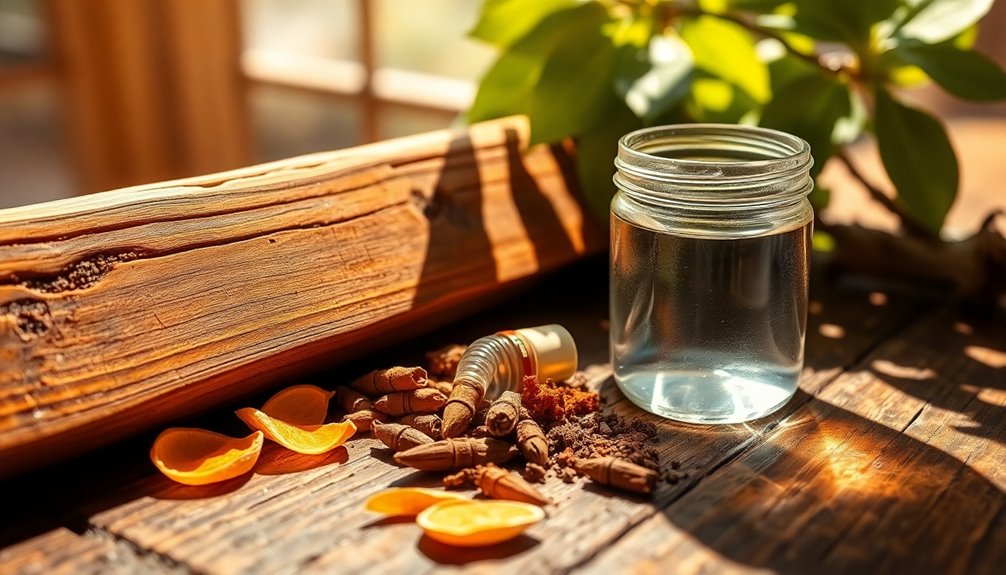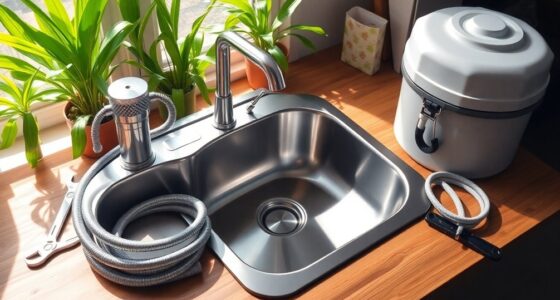To get rid of drywood termites naturally, look for signs like frass and hollow-sounding wood. You can use boric acid, orange oil, or diatomaceous earth to control infestations. Inject neem oil into infested areas or create a cayenne pepper paste for application. Keep humidity low and seal any cracks to prevent future invasions. Regular inspections are key. Want to discover more effective methods and preventive strategies? There's plenty more to explore!
Key Takeaways
- Apply boric acid mixed with water as a spray to disrupt termite nutrient absorption effectively.
- Use orange oil sprayed directly on termites for immediate contact killing.
- Inject neem oil into infested wood to disrupt reproductive cycles and deter future infestations.
- Sprinkle diatomaceous earth in affected areas to dehydrate and eliminate termites on contact.
- Create cardboard bait to attract termites for monitoring and natural elimination.
Identifying Signs of Drywood Termite Infestation

Have you noticed any unusual signs around your home? Identifying signs of drywood termite infestation is essential to protecting your property.
Look for small, pellet-like droppings known as frass near wood structures; these indicate they've been feeding. If you tap on wood and it sounds hollow, that's another alarming sign of damage.
Keep an eye out for blistering or peeling paint, which may suggest moisture issues linked to termite activity beneath the surface. Discarded wings often accumulate near windows or doors, hinting at an active infestation.
Additionally, small exit holes in wood surfaces are clear indicators of drywood termites at work. Address these signs quickly to prevent further damage to your home.
Natural Remedies for Controlling Drywood Termites
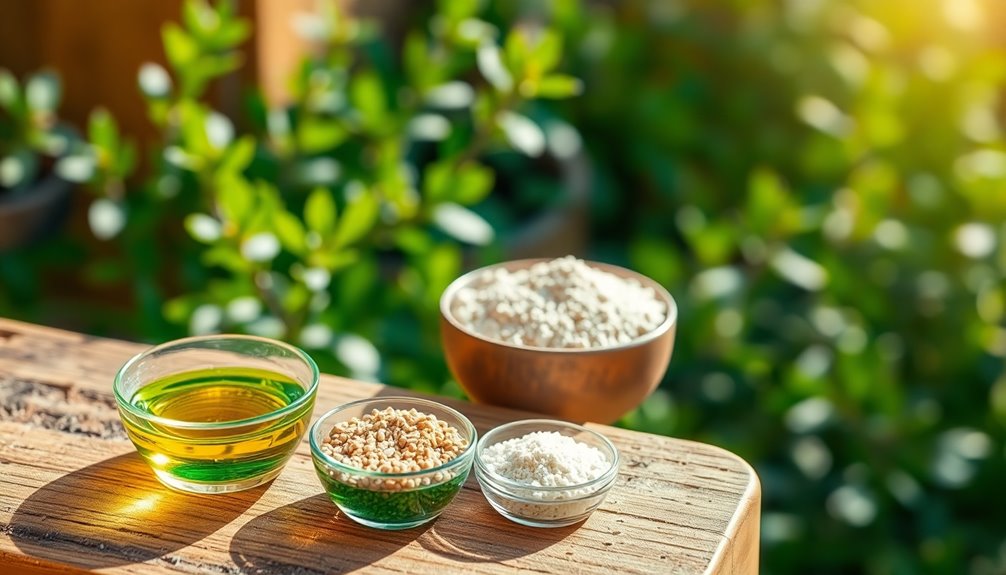
Once you've identified signs of a drywood termite infestation, it's time to take action using natural remedies that can effectively control these pests. Here are some effective homemade solutions:
| Remedy | Description |
|---|---|
| Boric Acid | A natural insecticide that disrupts nutrient absorption when ingested. |
| Orange Oil | Contains d-limonene; spray a mixture to kill termites on contact. |
| Neem Oil | Disrupts reproductive systems; inject or spray to prevent infestations. |
| Diatomaceous Earth | Non-toxic powder that dehydrates and kills termites upon contact. |
Additionally, you can use cardboard bait to attract termites, allowing you to monitor and eliminate them effectively. These remedies can help you control termite infestations naturally and keep your home safe.
Effective Application Techniques for Home Remedies
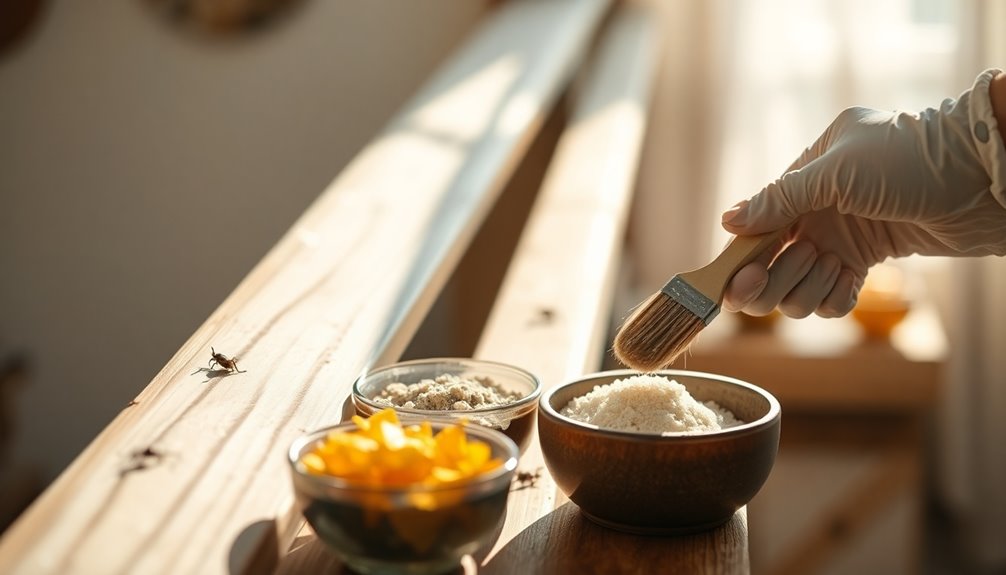
When tackling a drywood termite infestation, employing effective application techniques for your home remedies can considerably enhance their efficacy.
Start by using a syringe to inject a saltwater solution directly into wood entry points to kill termites effectively.
For affected areas, create a cayenne pepper paste with vegetable oil, apply it, and let it sit for several days.
A boric acid spray, made by mixing one teaspoon of boric acid in a cup of water, can disrupt their nutrient absorption.
Sprinkle diatomaceous earth where you notice signs of termites; its sharp particles will cut through their exoskeleton.
Finally, inject neem oil into infested wood to control and disrupt their reproductive cycles, preventing further infestations.
Prevention Strategies to Keep Drywood Termites Away
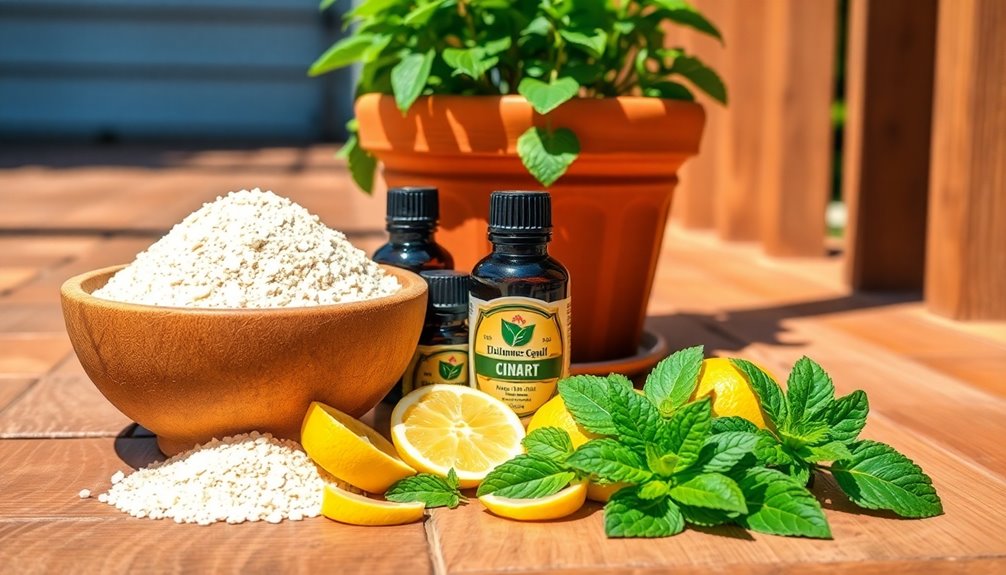
Preventing drywood termites from invading your home requires vigilance and proactive measures. Start by conducting regular inspections for signs of termites, like hollow-sounding wood and frass.
Maintaining low humidity levels is essential, so consider using dehumidifiers to create an environment that's less inviting for these pests. Make sure to seal cracks and crevices in your walls, windows, and doors to block their entry.
When it comes to firewood storage, keep it at least 20 feet away from your foundation and elevated off the ground. Applying protective coatings, such as wood preservatives, can also serve as effective deterrent methods against drywood termites.
When to Seek Professional Help for Termite Issues
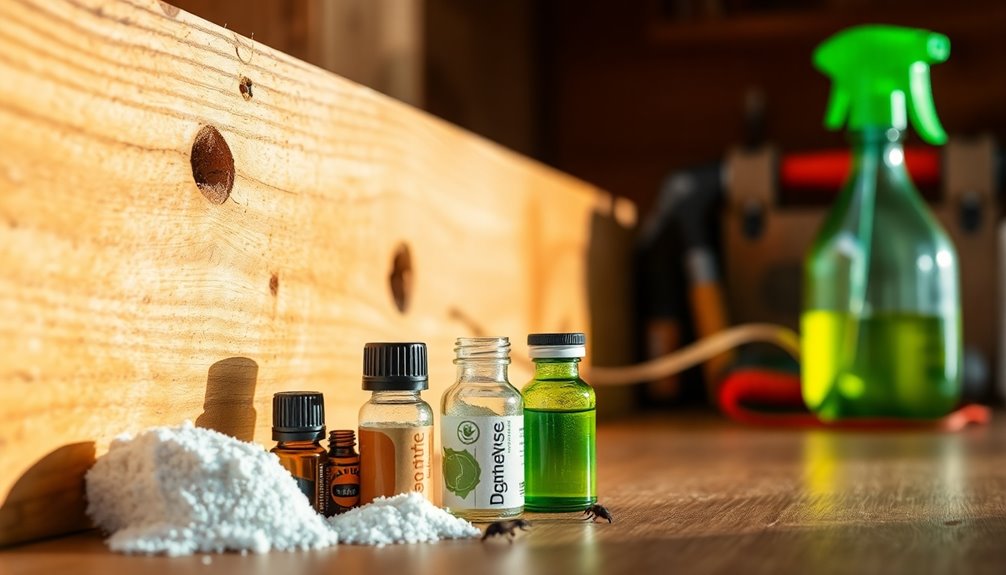
How can you tell if it's time to call in a professional for termite issues? If you notice any of the following signs, it's best to consult a professional:
- Extensive damage to wooden structures, like hollowed wood or discoloration
- Signs of a large infestation, such as multiple nests or significant frass accumulation
- Failed attempts at getting rid of termites using natural remedies
When dealing with a termite problem, professional pest control can provide targeted treatments that effectively address the issue.
If you're facing significant damage or need a thorough termite inspection—especially during real estate transactions—don't hesitate to seek help.
Early intervention can prevent future infestations and protect your investment in your home.
Frequently Asked Questions
Can I Treat Drywood Termites Myself?
Yes, you can treat drywood termites yourself!
Start by identifying the infested areas and consider using natural remedies like boric acid or orange oil for effective treatment.
You might also try heat treatment by exposing the wood to high temperatures.
Setting up cardboard traps can help capture them, and applying diatomaceous earth can dehydrate and kill the pests.
Just remember to stay persistent and monitor the situation regularly for best results.
Does Vinegar Kill Drywood Termites?
Yes, vinegar can kill drywood termites upon direct contact due to its acetic acid content, which disrupts their exoskeleton.
If you mix half a cup of vinegar with juice from two lemons, you'll enhance its effectiveness as a natural spray.
However, keep in mind that while vinegar may eliminate individual termites, it mightn't reach entire colonies hidden in wood.
Regular application is essential to maintain its effectiveness against these pests.
What Do Termites Hate the Most?
Did you know that termites cause about $5 billion in damages annually in the U.S. alone?
They particularly hate strong scents like orange oil and vinegar. These substances disrupt their environment, making them feel unwelcome.
Additionally, they can't tolerate boric acid or salt, which can dehydrate them.
Using diatomaceous earth also proves effective, as its sharp particles damage their exoskeletons, leading to dehydration.
Keeping these substances around can help repel termites effectively.
What Home Remedy Kills Termites in Wood?
If you're looking for home remedies that kill termites in wood, consider using boric acid. It disrupts their digestive systems, leading to their demise over time.
You might also try orange oil, which kills them on contact when injected into infested wood.
Neem oil can repel them and disrupt their reproduction, while a vinegar solution of equal parts white vinegar and lemon juice can penetrate the wood and eliminate termites effectively.
Conclusion
To summarize, tackling drywood termites naturally can be effective with the right approach and persistence. Did you know that about 20% of U.S. homes have experienced termite damage? By keeping an eye out for signs of infestation and using natural remedies, you can protect your home. Combine these methods with preventative strategies to create a termite-free environment. If the problem persists, don't hesitate to seek professional help—your home deserves the best care!
